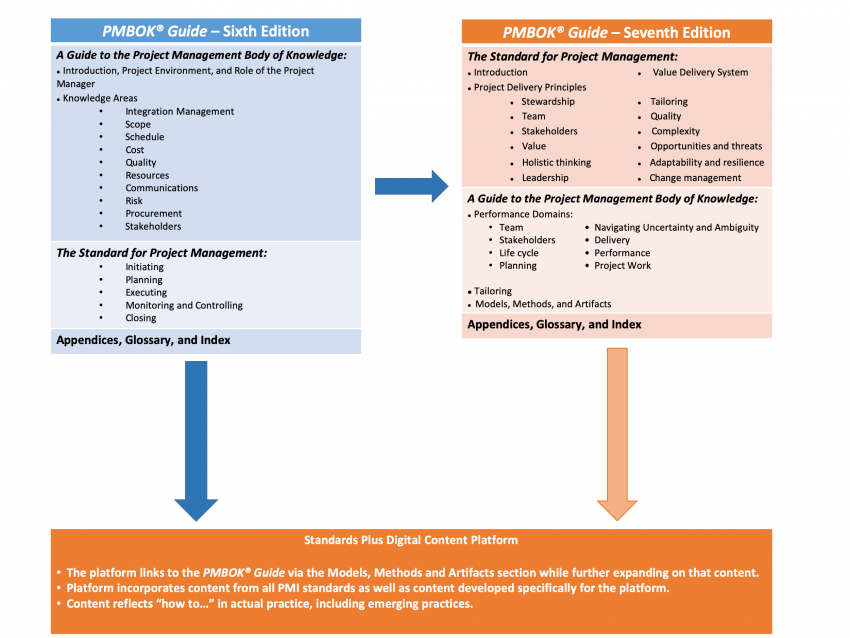The Standard of Project Management and PMBOK 7 (“The dawn of a new era!) (Download)
The Seventh Edition is a whole new beast. We are really focusing not so much on the outputs like we have seen before. We are focusing more on the outcomes. By Cyndi Dionisio, member of PMBOK 7 team
In PMBOK 7th edition, project management standards are primarily based on principles instead of processes, a paradigm shift from a process-based approach. The current knowledge areas comprising techniques, tools, inputs, and outputs are not included in the recent edition. The book focuses on the principles that are typically accepted and practised in project management. The transforming project dynamics emphasize on ultimate outcomes rather than deliverables. It is quite evident that this diverse field comes with great uniqueness which keeps on focusing on evolving aspects.
PMBOK 7
Until ver 6, PMBOK predominantly highlighted the waterfall project management techniques. With the transforming technology, competition is getting tough than ever before. Product life cycles are relatively short while the requirements keep on changing over time with the ongoing progress of the project. Considering the conventional project management strategies, it is unlikely to welcome quickly modifying project requirements.
Subsequently, agile project management techniques and approaches have emerged in the 2000s. The agile guidelines were highly adaptable in project management more specifically to the IT and software industry. The major change in the PMBOK 7th edition is the dramatic shift from process-based project management to principle-based project delivery. Therefore, it supports every type of project delivery. Another noticeable change is the shift in scope that addresses project delivery apart from the project management. This approach is more practitioner-friendly or action-focused.
PMBOK 7 Has two parts
- The Standard for Project Management: This deals with Principles and System of Value Delivery
- A Guide to the Project Management Body of Knowledge: This deals with the Project Performance Domains
PMP Certification Exam and PMBOK
It is important to note that the PMP exam is for the Profession of Project Management and the PMBOK Guide doesn’t serve as the syllabus of the PMP Exam. To be able to attempt the PMP Exam successfully you should begin the process from latest Exam Content Outline for PMP
PMBOK Versions
- PMBOK 1 – 1996 – ( 9 KA, 37 Processes)
- PMBOK 2 – 2000 – ( 9 KA, 39 Processes)
- PMBOK 3 – 2005 – ( 9 KA, 44 Processes)
- PMBOK 4- 2008 – ( 9 KA, 42 Processes)
- PMBOK 5- 2013 – ( 10 KA, 47 Processes)
- PMBOK 6- 2017 – (49 Processes, 10 KA and 5 Process Groups)
- PMBOK 7 – Q4 2020 (12 Principles and 8 performance Domains)
All editions of the PMBOK Guide till version 6 have been process-based, meaning that the primary, fundamental building blocks were processes, with their inputs and outputs connecting them and creating an integrated network that can be effective in projects. Process-based perspective is limited to what is considered in the standard. This does not mean that process-based approaches are not relevant or useful anymore. Many organizations and project management practitioners continue to use conventional project management delivery methods. Conventional approaches remain relevant in the context of PMBOK 7th Edition as well.
The standard of Project Management: PMBOK 6 vs PMBOK 7
| PMBOK Ver 6 | PMBOK Ver 7 |
| 5 Process Groups Initiating Planning Executing Monitoring and Controlling Closing | Project Management Principles Stewardship Team Stakeholders Value Holistic Thinking Leadership Tailoring Quality Complexity Opportunities and Threats Adaptability and resilience Change Management |
The Guide to the Project Management BOK: PMBOK 6 vs PMBOK 7
| PMBOk Ver 6 | PMBOK Ver 7 |
| Introduction Project Environment Role of Project manager 10 Knowledge Areas Project Integration Management Project Scope Management Project Schedule Management Project Cost Management Project Quality Management Project Resources Management Project Communications Management Project Risk Management Project Procurement Management Project Stakeholder Management | Tailoring Models, Methods and Artifacts 8 Performance Domains Team Stakeholders Development Approach & Life Cycle Planning Navigating Uncertainty and ambiguity Delivery Performance Project work |
Project Delivery Principles and PMBOK 7 References
| Project Delivery Principles | PMBOK- 7 Reference |
| Be hard-working and respectful | Stewardship |
| Create a culture of responsibility | Team |
| Actively engage stakeholders to comprehensively understand the interests and requirements | Stakeholders |
| Emphasize on value | Value |
| Acknowledge team interactions and respond accordingly | Holistic thinking |
| Encourage, influence, teach and learn | Leadership |
| Customize the delivery strategy | Tailoring |
| Ensure quality into procedures and outcomes | Quality |
| Take notice of the complications involved in knowledge and experience | Complexity |
| Report prospects and threats | Opportunities & threats |
| Be flexible | Adaptability & resilience |
| Allow change to accomplish the predicted future state | Change management |
References



5 thoughts to “The Standard of Project Management and PMBOK 7”
Pingback: PMI Application for Certifications is Revamped!! - Mudassir Iqbal, Professional Skills Trainer
Pingback: PMI Application for Certifications is Revamped!! (Sample Attached) - Mudassir Iqbal, Professional Skills Trainer
Proper planning and scheduling is very essential in projects for sinking and scheming delays of the project. Extensive amounts of time, money, resources are wasted each year in a construction industry due to improper planning and scheduling. With globalization the construction projects have become infinite and complex.
How to prepare without book
PMI is becoming one hell of money making machine ! We -volunteers- brought PMI where they are now. We are now obliged to use their training materials and to pay for it !